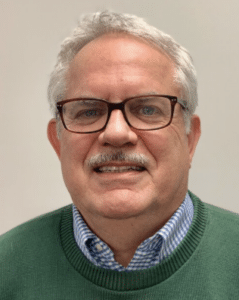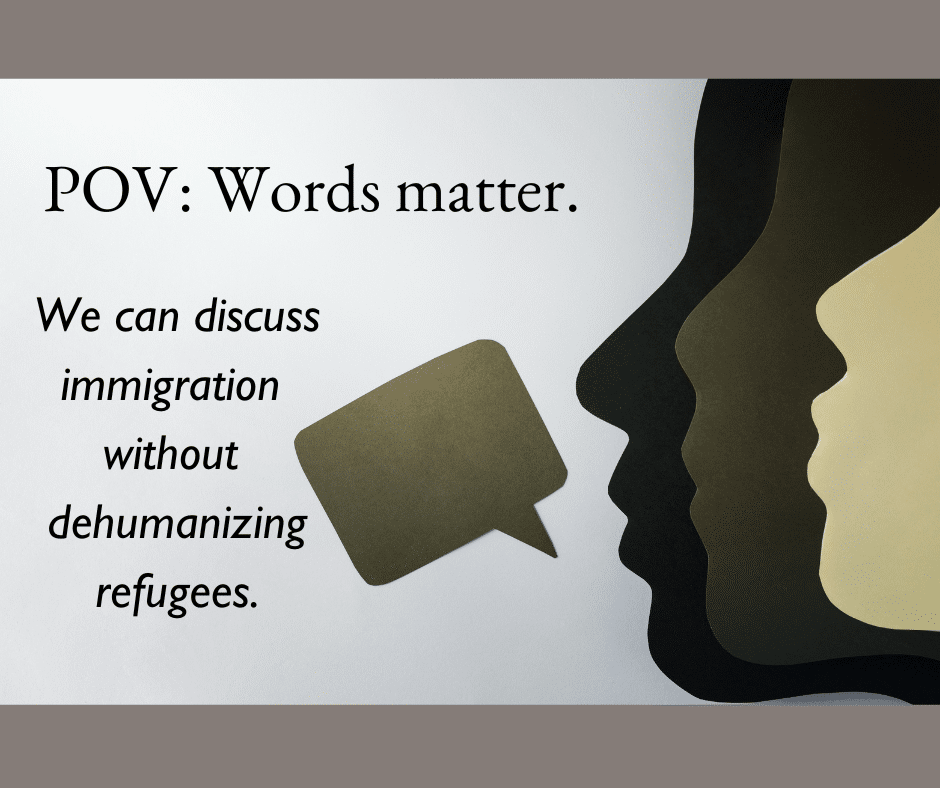 EMM recently heard from Rob Burgess, an Episcopalian who lives in Lincoln Township, south of Benton Harbor, Michigan. Now retired, Rob remains active as a volunteer with many local organizations, including Southwest Michigan Interfaith Action, a local soup kitchen, and Emergency Shelter Services of Benton Harbor. Rob also serves as Treasurer on the Vestry at St. Augustine of Canterbury Episcopal Church in Benton Harbor. Rob’s background, life experiences, and community engagement have made him especially sensitive to the vulnerabilities of people forced to flee their homes who seek safety and a new life in the U.S.
EMM recently heard from Rob Burgess, an Episcopalian who lives in Lincoln Township, south of Benton Harbor, Michigan. Now retired, Rob remains active as a volunteer with many local organizations, including Southwest Michigan Interfaith Action, a local soup kitchen, and Emergency Shelter Services of Benton Harbor. Rob also serves as Treasurer on the Vestry at St. Augustine of Canterbury Episcopal Church in Benton Harbor. Rob’s background, life experiences, and community engagement have made him especially sensitive to the vulnerabilities of people forced to flee their homes who seek safety and a new life in the U.S.
In response to the anti-immigrant rhetoric that has ramped up in this election season, Rob felt compelled to write an opinion piece for his local newspaper, The Herald-Palladium. Since the piece remains behind a paywall, Rob shared it with EMM, giving us permission to share his perspective along with further context on how he came to take this stance.
Rob’s interactions and relationships with people who have come to the U.S. in search of safety and a better life have been important to his journey. Rob points, for example, to his friend, “Doña Teresa,” using the Spanish title of respect for a woman. Originally from Nicaragua, Doña Teresa came to the U.S. years ago, fleeing domestic abuse, with two young children in tow. Offered refuge as a survivor of violence against women, Doña Teresa worked hard, made a new life for herself and her children, applied for legal permanent residency, and eventually became a social worker. Rob met her when he was serving as a volunteer for the United Way of Southwest Michigan, helping local residents fill out their income tax returns. The two became friends, and Doña Teresa eventually invited Rob to attend the ceremony when she became a U.S. citizen. “It was one of the most beautiful ceremonies I have ever attended,” Rob recalled. “New citizens from all continents (except of course Antarctica) were sworn in that day.”
Rob has also found inspiration in his involvement in the Episcopal Church, which has included service on the board of the Episcopal Peace Fellowship as well as his local parish. Rob was raised a Catholic, but after “drifting” for a while as a young man, eventually found his way to the Episcopal Church. As he tells the story, “I was a young CPA and auditor just out of college. My second client, straight out of school, was St. Mark’s Episcopal in Grand Rapids, Michigan. The bookkeeper at the time was Alida Densem.” Mrs. Densem had been serving in that role for a long time, and her skills made a big impression on young Rob Burgess.
In those days before personal computers, her books were all handwritten on a big black ledger. She kept the books, marriage, baptism, and other church records. Her handwritten records were meticulous. The importance of the dignity of all human work cannot be belittled. Alida clearly made an impact on that church, even if behind the scenes.
Rob was also impressed with the fact that the Episcopal Church was starting to ordain women. An organization that upheld the dignity of all people and recognized that gender did not in and of itself limit one’s gifts was one that appealed to Rob Burgess. And so he joined.
Rob’s belief in the inherent value of all human beings and the call to welcome newcomers is also shaped by his family history and experiences he had while serving in the U.S. Navy, from 1974 to 1980. Rob explains these influences in his opinion piece, which we share here, under the title given by the Herald-Palladium editor:
We must not dehumanize refugees
In late April 1975, the North Vietnamese and Viet Cong armies overran Saigon. The U.S. Embassy was hastily abandoned. Thousands of South Vietnamese refugees fled the country. At the time, I was a sailor serving on the USS Parsons with the U.S. Navy’s Seventh Fleet. It was the USS Midway, our sister ship the USS Worden, and other Navy vessels that rescued refugees from Saigon. I certainly remember TV images of American helicopters arriving with refugees from Vietnam. After landing and refugees disembarking, sailors pushed those helicopters overboard to make room for more incoming helicopters.
The Parsons remained near Japan. Our commanding officers told us that our duty was to protect Japan in case the North Koreans, Soviets or Chinese took advantage of the fleet occupied with Operation Frequent Wind, the evacuation of South Vietnam.
About five weeks later, the Parsons arrived in Guam on a cruise to Sydney, Australia, for joint exercises with our Australian and New Zealand allies. The Navy had transferred thousands of refugees from South Vietnam to Guam. The island was a tent city. The young, the old and those in between sheltered there. To this day, I remember one young Vietnamese woman.
Riding in a Navy pickup truck, a young officer and I had gone to get movies and videos to entertain the crew on the ship’s closed circuit TV station. As we drove through the refugee camp, a twenty-something woman dressed in a traditional Vietnamese white dress and round brim hat stopped us. A young child was near her. I assumed it was her child. She held up a picture to the officer and asked us if we knew the American serviceman in the picture. I presumed that it was her significant other and the father of the nearby child.
In the chaos of the evacuation of Saigon, she had apparently been separated from her serviceman. She was now a refugee on a remote island hundreds of miles from her home. Her future was very uncertain. Over the decades, I have frequently thought about that young woman and the child and wondered if she ever found her serviceman. I hope their later life was better than the life of refugees living in a tent at the end of the war.
Today, in several parts of the world, refugees are fleeing war, famine, extreme poverty, and violence. Hundreds of thousands, or even millions, are living in refugee camps. Unlike the Vietnamese refugee camp in Guam in 1975, often these camps do not have adequate food, shelter or sanitation to accommodate refugees. Some people have been in their refugee camp for months, others for years. Some arrive in the United States seeking asylum or temporary protected status, having escaped the turbulence of their homelands.
I assume that the Vietnamese woman we encountered in Guam in spring 1975 resides to this day somewhere in the continental United States. I wonder if she has empathy for the refugees who have arrived in the United States after fleeing violence, famine, war, or poverty in their home countries. I wonder what she would think about politicians who are critical of refugees, calling them awful names, implying that they are criminals or somehow less than human. I wonder if she ever thinks about her childhood home in Vietnam. I suspect that refugees in the U.S. now long for a time when they felt safe in their home country.
My maternal grandfather died before I was born. He left a small village in Moravia in what is now the Czech Republic to come to America in 1906. His wife, my grandmother, with my eldest uncle, arrived six years later in 1912. I assume it was poverty in their small, farming village which brought them to America. It may also have been the turmoil of the soon to collapse Austrian Empire. Grandfather farmed for six years in Michigan to save enough funds for my grandmother’s and uncle’s passage to America. My mother was their first child who survived birth in America. Grandmother died when I was a toddler. I understand that she barely spoke English at the time of her death. I sometimes wonder what my grandparents’ small village was like in their day and what it is like to this day.
My belief is that most refugees just want to live in peace having enough resources to safely raise their families just like the rest of us. Please, why can’t we debate immigration policy respectfully without denigrating those who are forced to flee troubled homelands?
* * *
Inspired by Rob Burgess’s example of civic engagement? Ready to write to your local news outlet to share your views on refugee resettlement, immigration reform, or other issues? EMM recommends the following resources for writing effective opinion pieces: Rethink Media Tip Sheet: Writing & Placing Op-eds and Harvard Kennedy School How to Write an Op-ed or Column. We’d also love to hear what you have to say. Reach out to us at emm@episcopalchurch.org .



